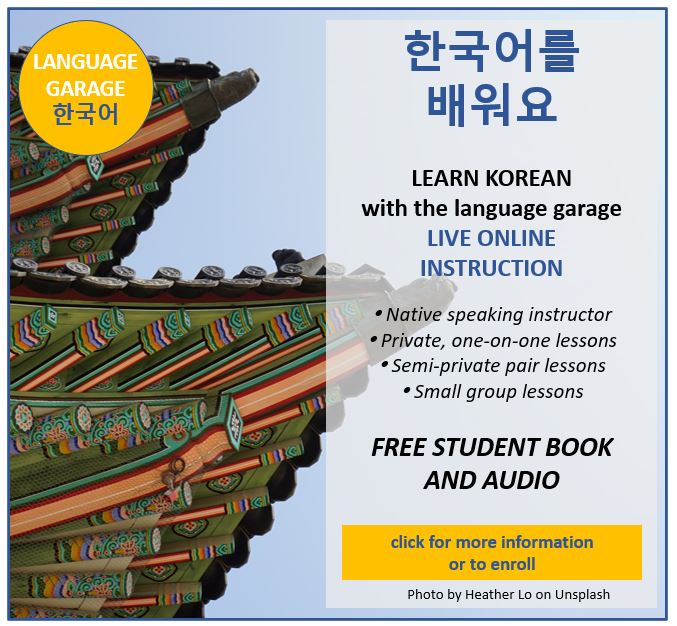Photo by Tachina Lee on Unsplash.
In this post we’ll look at Korean question words and how to use them.
네ne, 아니요aniyo: Yes, No
Let’s start with some general vocabulary and expressions related to questions: 질문 jilmun a question; 네ne yes; 아니요 aniyo no; 아마ama maybe; -이나 –ina, 또는 ttoneun, 아니면 animyeon or.
- (나는) 질문이 있어요.
(naneun) jilmun-i isseoyo.
I have a question. - 질문해도 될까요?
jilmunhaedo doelkkayo?
Can I ask you a question? - 몰라요.
mollayo.
I don’t know. - 확실하지 않아요.
hwakshilhaji anayo.
I’m not sure.
- 확실해요.
hwakshilhaeyo.
I am sure. - 이것은 차예요, 커피예요?
igeoseun chayeyo, keopiyeyo?
Is this tea or coffee? - 물 드릴까요,주스 드릴까요?
mul deurilkkayo, juseu deurilkkayo?
Do you want water or juice? - 여기가호텔이에요?
yeogiga hoterieyo?
Is this your hotel? - 네, 제 호텔이에요.
ne, je hoterieyo.
Yes, it’s my hotel. - 아니요, 제 호텔이 아니에요.
aniyo, je hoteri anieyo.
No, it’s not my hotel.
GRAMMAR TIP! There are a few different ways to say or in Korean, for example –이나 –ina, 또는 ttoneun, and 아니면 animyeon. Each one has its own uses and grammar, but a really simple and natural way to ask or offer X or Y is simply to say both options without any connective.
뭐? /무엇? mwo? /mueot? What?
To ask what, use 뭐 /무엇 mwo /mueot. 뭐 mwo is casual, and 무엇mueot is more polite.
- 이것은 무엇입니까? / 이게 뭐예요?
igeoseun mueoshimnikka? / ige mwoyeyo?
What is this? (polite/casual) - 뭐하고 있어요?
mwohago isseoyo?
What are you doing?
누구? nugu? Who?
To ask who, use 누구 nugu.
- 저 사람은 누구에요?
jeo sarameun nugueyo?
Who is that? - 누구와 함께 여행해요?
nuguwa hamkke yeohaenghaeyo?
Who are you traveling with?
어디? eodi? Where?
To ask where, use 어디 eodi.
- 화장실은 어디에요?
hwajangshil-eun eodieyo?
Where’s the bathroom? - 어디 살아요?
eodi sarayo?
Where do you live? - 어디에 가요?
eodie gayo?
Where are you going? - 어디에서 왔어요?
eodi-eseo wasseoyo?
Where are you from? Where do you come from?
언제? eonje? When?
To ask when, use 언제 eonje. A related question is 몇시에 myeotshi-e at what time?
- 어제 도착/출발 해요?
eoje dochak/chulbal haeyo?
When do you arrive/leave? - 생일이 언제예요?
saengiri eonjeyeyo?
When is your birthday? - 기차가 언제 떠나요?/ 도착해요?
gicha-ga eonje tteonayo?/ dochakhaeyo?
When does the train leave/arrive? - 가게는 언제 열어요 / 닫아요?
gage-neun eonje yeoreoyo / dadayo?
When does the store open/close? - 몇 시에 영화가 시작해요?
myeot shi-e yeonghwa-ga shijakhaeyo?
At what time does the film start?
어떻게 eotteohge How?
To ask how, use 어떻게 eotteohge.
- 한국어로hello를 어떻게 말해요?
hangugeo-lo helloreul eotteohge malhaeyo?
How do you say “hello” in Korean? - 어떻게 출근해요?
eotteohge chulgeunhaeyo?
How do you go to work? - 어떻게 생겼어요?
eotteohge saenggyeosseoyo?
What does he/she look like? (How does he/she look?)
얼마나? eolmana? How much?
To ask how much, use 얼마나 eolmana. To ask how many, use 몇 myeot plus the appropriate counter, for example: 몇명? myeotmyeong? how many people or 몇 잔? myeotjan? how many glasses?
- 이것은 얼마예요?
igeoseun eolmayeyo?
How much does this cost? - 몇명?
myeoymyeong?
How many people? - 우리 시간이 얼마나 있어요?
uri shigan-i eolmana isseoyo?
How much time do we have? - 티켓은 얼마예요?
tikes-eun eolmayeyo?
How much is a ticket?
GRAMMAR TIP! When you use numbers or talk about the quantity of something, you need to use counters in Korean. If you’re not familiar with counters, check out this post on numbers.
왜? wae? Why?
To ask why, use 왜 wae.
- 왜 여기 있어요?
wae yeogi isseoyo?
Why are you here? - 왜 화가 났어요?
wae hwaga nasseoyo?
Why are you angry? - 왜 웃고 있어요?
wae utgo isseoyo?
Why are you laughing/smiling?
Learn Korean with the Language Garage
Check out our other posts on Korean language, culture, and more. And if you’re looking for convenient and affordable live Korean lessons with a real teacher, check out The Language Garage. Our lessons are given online in a virtual classroom, so it doesn’t matter where you live or work – we can come to you. And we have flexible options, with a free trial so that you can decide if there’s a fit. Check us out!





